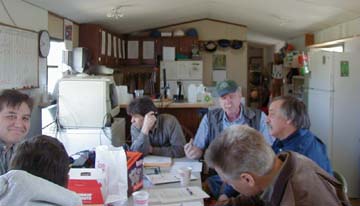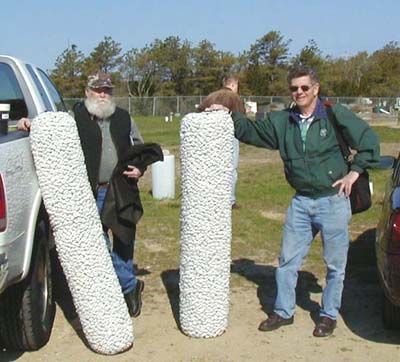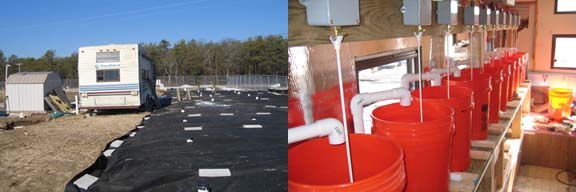The Massachusetts Alternative Septic System Test Center
Sub-pages: Basics | Construction History | Participants | Results | Pictures | Links
Overview
The Massachusetts Alternative Septic System Test Center is located in Sandwich, Massachusetts, on Kittredge Road at the Otis Air National Guard Base on the Massachusetts Military Reservation on Cape Cod. It was constructed by the Buzzards Bay National Estuary Program (BBNEP), a unit of the Massachusetts Office of Coastal Zone Management, in collaboration with Massachusetts Department of Environmental Protection (DEP), Barnstable County Department of Health and the Environment (BCDHE), and UMass Dartmouth’s School for Marine Science and Technology (SMAST).
Completed in 1998, the construction and operation of the facility was initially funded with a grant from the US EPA (Environmental Technology Initiative), with subsequent funding received from the Massachusetts Environmental Trust, the Massachusetts Office of Coastal Zone Management, the Massachusetts Department of Environmental Protection, and EPA Region I.
Initially, the Buzzards Bay National Estuary Program operated the facility. However, in 2001, the operations of the facility were transferred to Barnstable County. A data review committee, composed of the Buzzards Bay NEP, DEP, CZM, and BCDHE, continues to guide the work at the facility. George Heufelder, Barnstable County Health Director, oversees the facility for Barnstable County. Kevin Mrockza is the Test Center Operator.
The Barnstable County Department of Health and Environment set up a website for the Massachusetts Alternative Septic System Test Center.Please visit: masstc.org. We also added some of their photographs to this page.
Mission
The two-fold mission of the Test Center is
1) to evaluate the performance and operation costs of new and innovative wastewater disposal technologies in a carefully controlled and unbiased manner and provide this information to regulators and consumers, and
2) assist vendors in getting their technologies approved for use in Massachusetts more quickly and at a lesser cost.
Our hope is that the Test Center will lead to varied and economical alternatives to the conventional septic system, with improved benefits to the environment in Massachusetts and beyond.
Special Notice and Disclaimer
If a wastewater treatment technology is being tested by the Massachusetts Alternative Septic System Test Center as part of a technology verification program (RTI, ETV, or NSF testing), we may post these results. These results and performance of a technology apply only to the specific design or model number for that technology, with the wastewater-loading regime to which it was subjected. The observed results may not be comparable for other model numbers or variations of design from the manufacturer.
The Massachusetts Alternative Septic System Test Center’s Research & Development program enables vendors to experiment with or modify their systems to evaluate technology performance. In the R&D program, the Test Center provides wastewater to the system, and the vendors may manipulate the system in any way desired. In the R&D program, the Test Center may collect effluent and analyze samples for a fee. The Test Center cannot validate any claims by manufacturers participating in the R&D program.
Whether or not a technology is evaluated for a verification program, the Test Center is not responsible for any manufacturers claims, nor does participation in a Test Center program imply an endorsement from the Commonwealth of Massachusetts, Barnstable County, nor any granting agency, for that technology.
Contact Information
For information about participating in the Test Center, obtaining data, or arranging a tour or workshop, contact:
Keith J. Mroczka (Test Center Operator)
mail: 4 Kittredge Road, OTIS ANGB, MA 02542
voice: 508-563-6757
fax: 508-563-6757 (call first)
email: masstc@barnstablecounty.org
For Buzzards Bay NEP information, fact sheets, reports, and CDs related to this web page and original initiative, contact Dr. Joe Costa, Director, Buzzards Bay NEP, call (508) 291-3625 x19, or email joe.costa@state.ma.us or go the Barnstable County Massachusetts Septic Test Center website https://www.masstc.org/.
Past Updates
The Barnstable County Department of Health and Environment has issued an important report on the performance of nitrogen removal onsite systems on Cape Cod. It is titled Performance of innovative alternative onsite septic systems for the removal of nitrogen in Barnstable County, Massachusetts 1999-2007 (365 kb pdf).
An important finding of the report was that for systems tested at least four times, only 69% of single-family systems and 60% of multifamily systems had median concentrations that met the state standard of 19 parts per million (ppm) for nitrogen removal systems. Performance was somewhat better for systems that were monitored for longer periods of time. Different technologies often have markedly different performance. For example, one new test system showed a remarkably low median discharge concentration of 2.7 ppm. The study did not evaluate the data set to answer important questions such as whether or not more recently installed systems were performing better than older systems, or whether the performance of individual systems improves or declines over time.
One important conclusion of the report is that “Towns that contemplate the wide-scale use of I/A systems to address nutrient issues should understand that the oversight of operation and maintenance of I/A systems is an essential part of ensuring a level of success. Quite simply, I/A systems that are not regularly inspected and occasionally monitored will not achieve treatment objectives.”
An equally important finding, but one not articulated in the report, is that the median performance for all technologies evaluated appears to be around 13 ppm (see figure 8, the authors do not provide means or medians for any data set). These results mean that, collectively, from a nitrogen loading point of view, nitrogen removal systems are working on Cape Cod because cumulatively they are reducing loading below the regulated performance standard of 19 ppm. If Boards of Health require improved performance of under-performing systems, the collective mean nitrogen discharge from these systems would be further lowered.
Testing Programs
- Environmental Technology Initiative (ETI): This was the first initiative of the Test Center and incorporated testing technologies in triplicate over two years. The program operated from 1999 to 2002, tested 6 technologies (including a conventional Title 5 system), and has now terminated. Grants for this original program were awarded to the Buzzards Bay NEP and included funds for the construction of the Test Center. Participants agreed to install three of their systems at no cost. In return they received comprehensive testing at a nominal cost. If successful, participants received Piloting Approval in Massachusetts.
- Environmental Technology Verification (ETV): The ETV Program which is funded by the EPA, and being conducted in partnership with the NSF International. Under the ETV program, the Test Center is establishing national protocols for evaluation of nitrogen removal and septic system stress testing. Additional Systems are being tested under this program. The program tests one unit of the technology for 14 months. Five technologies have been evaluated, one is pending.
- Independent testing: Approximately ten technologies have been tested using modified ETV testing protocols. These evaluations are at various stages of completeness.
- Phosphorus Removal Technologies: This work was undertaken through a special DEP-EPA 319b grant. Three technologies are currently being evaluated.
- Unspecified National Testing Protocol Testing: Three Technologies Completed, one in process.
- Research and Development “Open enrollment”: Various companies have utilized Test Center space for Research and Development. This is allowed on a first-come basis as space is available.
Testing Areas
- Standard Treatment Testing (TSS, BOD, fecals)
- ETV Nitrogen Testing
- Phosphorus Removal Technologies
- Virus Research
- Seasonal – Intermittent Use Research
- Research and Development
Future of the Facility
The Test Center remains the foremost facility of its kind in the United States. In recent years, the facility has largely become self-sufficient for operations based on fees collected by participants in testing programs, and participants using the site for research and development of novel technologies. Barnstable County also continues to receive state and federal grants for specialized testing, and is a participant in the AmeriCorps program.
Results
For the final results reported for our original ETI grant, the first seven performance fact sheets (2001-2002), and later findings of other technologies tested at MASTCC and reported by NSF International through the EPA ETV program, go to our Results Page.
Two year summary report on nitrogen removal performance of five alternative septic system technologies
Report published in September 2002 Environment Cape Cod Journal. This is a preprint with most editorial changes included. (187 kb pdf file – Improved Oct. 03 PDF version) . Citation: Costa, J., G. Heufelder, S. Foss, N.P. Millham, and B.L. Howes. 2002. Nitrogen removal efficiencies of three alternative septic technologies and a conventional septic system. Environment Cape Cod 5(1):15-24
List of Approved Technologies in Massachusetts
Are you a homeowner considering installing an alternative septic system? Are you a town official wanting to know what technologies have been approved by DEP? Well, DEP has put together a great summary page listing all the technologies approved for use in Massachusetts. Go to:
MA DEP’s summary page of IA approvals in MA web page.
Approvals range from “General Use” (used anywhere a Title 5 system can be installed) to “piloting” (15 units allowed to be installed in Massachusetts to provide field testing and technical demonstration of the system). Keep in mind not all alternative technologies are approved for nitrogen removal.
DEP has good general information on septic systems on their Title 5 Information page.
Articles, Progress Reports, and Talks
Presentation by George Heufelder in 2003 to the Massachusetts Health Officers Association. A 1.1 MB pdf file.
Article from the MCZM “Coastlines” newsletter September 2001 issue
An article on the release of the Septic System Test Center fact sheets by BBP Executive Director, Joe Costa.
August 1999 progress report to Massachusetts Environmental Trust, a Test Center funder.
Some slides from a 2000 Enviro Expo talk by Dr. Joe Costa.
Go to our ETI Results page for more recent reports.
Related sub pages:
SepTrack.
To help municipal Boards of Health better track the installation, permitting, inspection, and pumping of septic systems, the Buzzards Bay NEP conceived and paid for this septic tracking software package.
Septic System Slide Show.
Here is a slide show that highlights septic system performance and siting requirements in Massachusetts.

May 2005: MASSTC Data Review and Oversight Committee composed of various agency staff and scientists.

May 2005: EZ-Flow filter (Ring Industrial Group) vendor with (former) DEP IA septic system coordinator, Steve Coor.

February 2006: Subsampling system trailer set up, and inside the building.